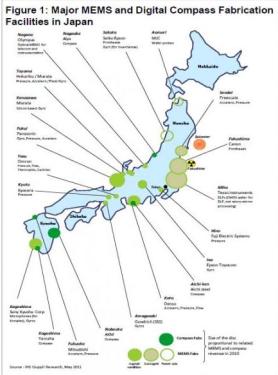 According to a study by IHS iSuppli Corporation, nearly two months after Japan’s earthquake and tsunami hit global industrial supply chains, the global micro-electromechanical systems (MEMS) industry has completely recovered, and relatively few have been hit by this severe disaster.
According to a study by IHS iSuppli Corporation, nearly two months after Japan’s earthquake and tsunami hit global industrial supply chains, the global micro-electromechanical systems (MEMS) industry has completely recovered, and relatively few have been hit by this severe disaster. So far, the supply of MEMS sensors and actuators has been only slightly affected. The impact of the Japanese earthquake on the global MEMS industry is mainly reflected in demand, not supply. Manufacturers with damaged factories are more affected than suppliers, and bottlenecks in other parts of the supply chain are also affecting manufacturers' production operations.
MEMS devices are used in many consumer electronics products such as smart phones and tablet computers, but also in the industrial, medical and aerospace industries. Considering that nine out of the world's 50 largest MEMS manufacturers are Japanese companies, and Japan is a strong manufacturing base for MEMS companies headquartered in Western countries, Japan plays an important role in MEMS production and supply.
In 2010, Japanese companies had MEMS sales of approximately 1.38 billion U.S. dollars, accounting for 21.3% of the global market demand. Canon, Panasonic, Epson and Denso are among the top 20 MEMS companies in the world.
According to the sales of Japanese MEMS manufacturers and foreign companies that deal with MEMS in Japan, in 2010, MEMS sensors and actuators, which accounted for approximately 32.5% of global sales, were processed in Japanese factories. Western companies that have MEMS factories in Japan include: Freescale Semiconductor, Knowles Electronics, and Goodrich Corp. And Texas Instruments. The CMOS circuits in the Texas Instruments Digital Light Processing (DLP) chipset are manufactured in Japan.
In addition, almost all digital compasses in the world are produced in Japan. This device is rapidly becoming standard equipment for GPS-enabled tablets and mobile phones. According to a study by IHS iSuppli Corporation, global digital compass shipments reached 263 million in 2010, a dramatic increase of 354% from 58 million in 2009, and it is expected to surge to 1.28 billion by 2015. AKM Semiconductor, Yamaha, Aichi Steel and Alps Electric, the four Japanese companies, produced a digital compass that together accounted for 97% of global supply.
For the global MEMS industry as a whole and the Japanese MEMS industry, due to the geography of geography, the losses suffered are lighter than those of other industries. Most MEMS factories and foundries are located in Honshu, in the south of Japan, far from the hardest hit areas in northern Japan. Moreover, MEMS and compass suppliers have been relying on factories for production before the earthquake and tsunami.
Damage report: Only three factories were directly damaged by IHS iSuppli's research shows that of the 22 most important MEMS and compass factories in Japan, only three are directly damaged, but the other 19 plants may be affected by logistics and power supply throughout Japan. Impact of the problem. The three damaged factories belong to Freescale, Canon and Texas Instruments, respectively. The figure below shows the distribution of MEMS and digital compass factories across Japan.
According to Freescale, the company has decided to close the Sendai 150mm fab near the epicentre and to focus on accelerating the transfer of MEMS production to the 200mm Oak III plant in Texas.
Freescale is very fortunate that its Sendai plant was originally scheduled to close by the end of 2011, and the company has long established a buffer stock. IHS believes that if these decisions were not made in 2009, Freescale and its customers will certainly be hit hard.
Canon produced printers and MEMS print heads in Fukushima City, and a nuclear accident took place in the city. The company’s factory was severely damaged and production has stopped. However, Canon quickly repaired the factory and resumed full production in the first week of April. According to data from IHS iSuppli, the impact of this disaster on Canon’s MEMS sales in 2011 is expected to be very limited.
The MTR plant of Texas Instruments is located in the northeast of Tokyo, and the infrastructure system for transporting chemicals, gas, water, and air has begun to be repaired. The company said that the factory can resume full production in September. Prior to the earthquake, Texas Instruments had used a number of plants to produce CMOS wafers for DLP MEMS chips, and the company was able to quickly increase the output of other plants to make up for the drop in production at the Mie plant.
Microwave Sensor Led Corn Bulb for Ceiling Lighting, Led Corn Bulb Retrofit
Dimmable Motion Sensor retrofit LED Bulb ceiling lamp lighting bulb E27 G24
80% more energy saving compared with conventional light, CFL, Incandescent light; replace 40W incandescent bulb by only 5W.
24pcs Super Bright 2835 SMD LED chip as light source, 300lm, 120 degree beam angle.
No Ballast Required (Remove the ballast)
Working Mode: ON/OFF ; 100%~20% standby
Microwave Sensor LED Corn Bulb/Step Light
Microwave Sensor Led Corn Bulb,Microwave Sensor Led Step Light,Led Corn Bulb,Dimmable Led Corn Bulb
Zhongshan ALLMAY Tech Lighting Co., Ltd. , http://www.sensorledlights.com